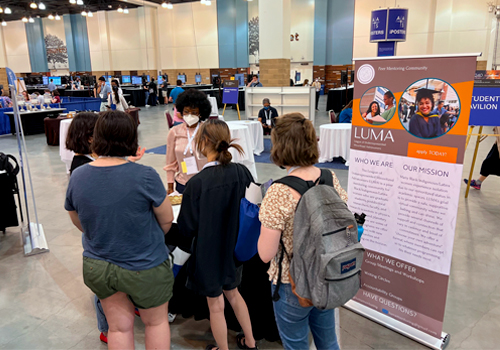As a child growing up in Ghana, Jacqueline Antwi-Danso had many interests — including astronomy. Education was very important to her parents and they helped fuel those interests by giving her lots of books to read. She also remembers a book from her junior high school library that described how stars are born and how the most massive stars die in gigantic explosions called supernovae.
“The book explained that there were objects out in space that gave off so much energy we could see and study them and make precise observations of their physical properties,” she says. “That just blew my mind.”
Today, Antwi-Danso is a NSERC Banting Postdoctoral Fellow with the David A. Dunlap Department of Astronomy & Astrophysics, studying massive galaxies that formed, she says, “when the universe was still just a baby.” She is also active in supporting Black, Latinx and Indigenous women interested in a career in science. Antwi-Danso was the only U of T fellow chosen in 2023 and one of only three fellows in astronomy and astrophysics across Canada.
She spoke to A&S News about her career, research and goals.
In your journey from Ghana to U of T and becoming an astronomer, was there an especially important steppingstone?

After high school my plan was to take a gap year to figure out if I wanted to stay in Ghana and do something in the sciences at the university level or go elsewhere.
That’s when an opportunity came my way. There was a program run by the American Embassy in Accra for Ghanaian high school students interested in studying in the U.S. It provided mentorship for things like how to apply to schools in the U.S., how to write a good college application, how to select courses; they also helped you think about what you wanted to do in your career.
And it was a big turning point in my life when I was selected to join the program. That’s how I learned about opportunities outside of Ghana and realized that if I was going to study astronomy, I would have to leave because we don't have astronomy at the collegiate level. And so, I made my decision to study astronomy at Texas Christian University.
As an astronomer, what do you study? What questions are you trying to answer?
I study massive galaxies in the very distant universe — some of the very first structures that formed after the Big Bang nearly 14 billion years ago. We're trying to understand why these galaxies formed the way they did and how they became so big so quickly. We’re finding them at increasingly earlier times, as far back as when the universe was just 4 per cent of its current age.
This goes against our understanding of the hierarchical formation of large structures — where massive galaxies like our Milky Way Galaxy were formed from the merger of galaxies which were formed from stars which, in turn, formed from clouds of gas and dust.
For our galaxy, it took billions of years to attain its current stellar mass. These distant, massive galaxies had only a fraction of the time to go through this process, so we have no idea how they formed so quickly. So, one of two things is happening: either there's something wrong with our observations, or we need to revise our current models. That's the big problem I'm working on and I’m actually looking for a summer undergraduate student to work on this project.
In addition to your research, you’ve working to support Black, Indigenous and Latinx women in science through the mentorship program, LUMA. Can you tell us more about that?

LUMA is a peer mentoring organization for women in astronomy, physics and the planetary sciences that was formed in 2015 by Catherine Espaillat who is the director of the Institute for Astrophysical Sciences at Boston University. She started LUMA because, as a Dominican American grad student, she felt isolated.
There weren’t many people in her field who looked like her, with whom she shared backgrounds. So, she created LUMA to be a community of people with similar experiences who could provide each other with support. I joined because I also realized there weren't many people in my field who looked like me. There were even fewer African astronomers. And, like Catherine, I wanted a place where we could come together as a community and support each other.
Do have you have plans to do the same type of work here in Canada?
I would like to continue this work, so I've been learning about and trying to understand what the Canadian science landscape looks like. I think the challenge in Canada is similar to the challenge that LUMA faces in the U.S. — there are very few Black, Indigenous or Latinx women in science in either country. So, yes, I would like to do similar work here — I just don't know what that looks like yet.
What about in Ghana?
One thing that I had in mind was trying to create some sort of pipeline for students in Ghana who might be interested in astronomy and might want to study in the U.S. or Canada. There are challenges, of course, but I’m talking to people who have been involved in similar projects and have found solutions to these challenges. For example, it might mean helping by providing mentorship to students who are already interested in physics, to students who are a little further along in their studies. I'm hopeful there are a number of ways to make this work.
Finally, how do you feel about receiving the Banting Fellowship?
I’m very grateful and humbled to receive it. For me, it represents an exciting opportunity to work independently on my research — especially at U of T with all the people in the Dunlap Institute, the Department of Astronomy & Astrophysics, CITA and the Department of Statistical Sciences. I feel like U of T is the perfect place for me because I’m combining astronomy with statistics and cosmological simulations to understand these really massive, distant galaxies. I’m having the time of my life and I’m looking forward to seeing what the next few months will bring.
Listen to Jacqueline Antwi-Danso talk about her career, her science and her love of Marvel movies.

